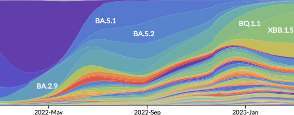Innate Immunity & Infection Biology
The collection of molecules, cells and mechanisms that operate to defend the host from the invasion by other organisms or harmful molecules is commonly referred to as the immune system. In the vertebrate, the innate immune system constitutes the first line of defense against pathogens (e.g. viruses and bacteria) and also plays an integral role in establishing and orchestrating adaptive immune responses. Cells of the innate immune system express a diverse repertoire of germ-line encoded receptors that sense the presence of non-self or harmful at the molecular level and signal towards the initiation of effector mechanisms geared at the elimination of the threat.
Groups at the Gene Center are trying to decipher how the innate immune system senses non-self by employing cell biological, virological, genetic, and biochemical approaches. Beyond its relevance for our understanding of host pathogen interactions and development of antiviral strategies, these studies also provide important insights into the pathogenesis of sterile inflammatory diseases, in which aberrant activation of the innate immune system is often at play.






